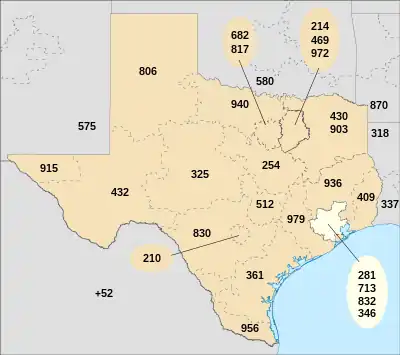Area codes 713, 281, 832, and 346
Area codes 713, 281, 832, and 346 are telephone area codes in the North American Numbering Plan (NANP) forming an overlay complex for Houston, Texas and its environs. Area code 713 is one of the original four area codes established for Texas in 1947.

History
When the North American Numbering Plan was established in 1947, Texas was divided into four numbering plan areas (NPAs), roughly outlining four quadrants in the state. Area code 713 was assigned to the southeastern part, from the Sabine River to the Brazos Valley.
On March 19, 1983, the numbering plan area was divided for the first time. The immediate Houston area retained area code 713, while the northern, eastern and western portions became area code 409.
On November 2, 1996, area code 713 was split again, with most of Houston's suburbs switching to area code 281. The dividing line roughly followed Beltway 8. Generally, the majority of Houston itself and most of the suburbs inside the beltway kept area code 713, while 281 served everything outside the beltway. However, area code 713 was retained by all cellphone customers in the Houston area.
Although this was intended as a long-term solution, the rapid growth in demand for telephone services from the proliferation of pagers and cell phones required additional numbering resources within two years in both numbering plan areas. On January 16, 1999, the 713/281 boundary was removed, creating an overlay for the combined area, while simultaneously adding a third area code to the entire region, area code 832. As a result, ten-digit dialing became required for all calls in the Houston area.
On May 9, 2013, the Public Utility Commission of Texas announced the addition of yet another code, area code 346, to the Houston overlay as of July 1, 2014.[1] This had the effect of allocating over 31 million telephone numbers to a service territory of eight million people. Exhaust projections of 2022 forecast that the Houston area will not need a fifth area code until about 2026, additional area code 621 will be needed by 2026 .[2]
Service area
Counties served by these area codes:
Towns and cities served by these area codes:
- Addicks
- Alvin
- Arcola
- Bacliff
- Baytown
- Bellaire
- Brookshire
- Brookside Village
- Bunker Hill Village
- Channelview
- Cleveland
- Clodine
- Conroe
- Crosby
- Cypress
- Deer Park
- El Lago
- Dickinson
- Fresno
- Friendswood
- Fulshear
- Galena Park
- Hedwig Village
- Highlands
- Hilshire Village
- Hitchcock
- Hockley
- Houston
- Huffman
- Humble
- Hunters Creek Village
- Iowa Colony
- Jacinto City
- Jersey Village
- Katy
- Kemah
- Kingwood
- Klein
- La Marque
- La Porte
- League City
- Liverpool
- Magnolia
- Manvel
- Meadows Place
- Missouri City
- Mont Belvieu
- Montgomery
- Nassau Bay
- New Caney
- Pasadena
- Pattison
- Pearland
- Pinehurst
- Piney Point Village
- Plum Grove
- Porter
- Richmond
- Romayor
- Rosenberg
- Rosharon
- Rye
- Santa Fe
- Seabrook
- Simonton
- South Houston
- Splendora
- Spring
- Spring Valley Village
- Stafford
- Sugar Land
- Taylor Lake Village
- Texas City
- The Woodlands
- Thompsons
- Tomball
- Webster
- West University Place
See also
References
- Hlavaty, Craig (May 9, 2013). "Houston gets new area code to keep from running out of phone numbers". Houston Chronicle. Retrieved May 9, 2013.
- "2022-1 NRUF and NPA Exhaust Analysis" (PDF). North American Numbering Plan Administrator. April 21, 2021. Retrieved April 24, 2021.
Further reading
- Hlavaty, Craig (May 9, 2013). "Wait, area code pride is still a thing?". The Texican (blog). Houston Chronicle. Archived from the original on June 7, 2013. Retrieved October 4, 2018.
External links
| North: 936 | ||
| West: 979 | Area codes 281/346/713/832 | East: 409 |
| South: Gulf of Mexico |